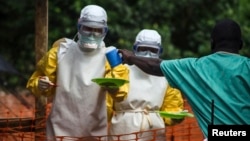The World Health Organization (WHO) said on Tuesday it had shut a laboratory in Sierra Leone after a health worker there was infected with Ebola, a move that may hamper efforts to boost the global response to the worst ever outbreak of the disease.
At least 1,427 people have died and 2,615 have been infected since the disease was detected deep in the forests of southeastern Guinea in March. A separate outbreak was confirmed in Democratic Republic of Congo on Sunday.
The WHO has deployed nearly 400 of its own staff and partner organizations to fight the epidemic of the highly contagious hemorrhagic fever, which has struck Sierra Leone, Liberia, Guinea and Nigeria.
Nigeria's health minister said on Tuesday his country had “thus far contained” the Ebola outbreak, with only one of 13 confirmed cases being treated in isolation.
The WHO said it had withdrawn staff from the laboratory testing for Ebola at Kailahun -- one of only two in Sierra Leone -- after a Senegalese epidemiologist was infected with Ebola.
“It's a temporary measure to take care of the welfare of our remaining workers,” WHO spokesperson Christy Feig said, without specifying how long the measure would last. “After our assessment, they will return.”
Feig said she could not assess what impact the withdrawal of WHO staff would have on the fight against Ebola in the Kailahun, the area hardest hit by the disease.
One of the deadliest disease known to man, Ebola is transmitted by contact with body fluids and the current outbreak has killed at least 120 healthcare workers.
The Senegalese medic -- the first worker deployed by WHO to be infected -- will be evacuated from Sierra Leone in the coming days, Feig said. He is currently being treated at a government hospital in the eastern town of Kenema.
Congo outbreak
With its resources stretched by the West African outbreak, medical charity Medicins Sans Frontieres (MSF) said on Tuesday it could provide only limited help to tackle Congo's outbreak.
A report from the U.N. mission in Congo on Tuesday said 13 people there had died from Ebola, including five health workers.
Congo said on Sunday it would quarantine the area around the town of Djera, in the isolated northwestern jungle province of Equateur, where a high number of suspected cases has been reported. It is Congo's seventh outbreak since Ebola was discovered in 1976 in Equateur, near the Ebola river.
“Usually, we would be able to mobilize specialist hemorrhagic fever teams, but we are currently responding to a massive epidemic in West Africa,” said Jeroen Beijnberger, MSF medical coordinator in Congo. “This is limiting our capacity to respond to the epidemic in Equateur Province.”
However, the charity said it would send doctors, nurses and logistics experts to the region and would work with the government to open an Ebola case management center in Lokolia.
Congo's Health Minister Felix Kabange Numbi said on Sunday the outbreak in Equateur was a different strain of the virus from the deadly Zaire version in West Africa.
The WHO plans to send protective equipment for medical staff in Equateur.
Sierra Leone and Liberia -- struggling to recover from a decade of civil war in the 1990s -- have seen their healthcare systems overwhelmed by Ebola, the first outbreak in West Africa.
US health official: Ebola has 'upper hand'
Dr. Tom Frieden, director of the U.S. Centers for Disease Control and Prevention, is visiting Liberia, Sierra Leone and Guinea, the three hardest-hit countries, this week.
On Tuesday, he continued his visit in Liberia, which has the most cases and deaths.
"Lots of hard work is happening, lots of good things are happening," Frieden told a meeting attended by President Ellen Johnson Sirleaf on Monday. "But the virus still has the upper hand."
But he expressed optimism that the outbreak can be contained.
"Ebola doesn't spread by mysterious means, we know how it spreads," Frieden said in his remarks, which were broadcast on Liberian TV. "So we have the means to stop it from spreading, but it requires tremendous attention to every detail."
Liberia has resorted to some of the most stringent measures to control the disease, including sealing off an entire slum neighborhood in the capital. Sirleaf has also declared a state of emergency and ordered all her ministers and top government officials to remain in the country or return from any trips.
Liberia orders government ministers home
Sirleaf issued orders on Tuesday that any official of ministerial rank who had not returned to their duties would be dismissed. Civil servants who failed to report for work would also have their salaries suspended, a presidency official told Reuters.
Some Liberian officials have been fleeing the country or just not turning up at work for fear of contracting the virus.
It was not immediately clear how many officials would be affected by the presidential order.
Liberia said a ban on travel to the region imposed by neighboring countries was complicating the fight against Ebola and leading to shortages of basic goods.
“Isolating Liberia, Sierra Leone and Guinea is not in any way contributing to the fight against this disease,” Information Minister Lewis Brown said. “How do we get in the kinds of supplies that we need? How do we get experts to come to our country? Is that African solidarity?”
Some information for this report provided by AP.






